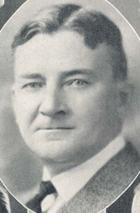John J. Blaine
John J. Blaine | |
|---|---|
 | |
| United States Senator from Wisconsin | |
| In office March 4, 1927 – March 3, 1933 | |
| Preceded by | Irvine Lenroot |
| Succeeded by | Francis R. Duffy |
| 24th Governor of Wisconsin | |
| In office January 3, 1921 – January 3, 1927 | |
| Lieutenant | George F. Comings Henry A. Huber |
| Preceded by | Emanuel L. Philipp |
| Succeeded by | Fred R. Zimmerman |
| 23rd Attorney General of Wisconsin | |
| In office January 6, 1919 – January 3, 1921 | |
| Governor | Emanuel L. Philipp |
| Preceded by | Spencer Haven |
| Succeeded by | William J. Morgan |
| Member of the Wisconsin Senate from the 16th district | |
| In office January 1, 1909 – January 1, 1913 | |
| Preceded by | Edward E. Burns |
| Succeeded by | Robert Glenn |
| Mayor of Boscobel, Wisconsin | |
| In office April 1906 – April 1907 | |
| In office April 1903 – April 1904 | |
| In office April 1901 – April 1902 | |
| Personal details | |
| Born | John James Blaine May 4, 1875 Wingville, Wisconsin, U.S. |
| Died | April 16, 1934 (aged 58) Boscobel, Wisconsin, U.S. |
| Resting place | Boscobel Cemetery |
| Political party | Republican |
| Spouses |
|
| Children |
|
| Alma mater | Valparaiso University |
John James Blaine (May 4, 1875 – April 16, 1934) was an American lawyer and progressive Republican politician from Grant County, Wisconsin. He was the 24th governor of Wisconsin, serving three terms from 1921 to 1927, and served as United States senator from 1927 to 1933. Earlier, he was the 23rd Attorney General of Wisconsin, a member of the Wisconsin Senate, and mayor of Boscobel, Wisconsin.
Early life and education
[edit]Blaine was born on May 4, 1875, in Wingville, Wisconsin. Blaine attended the common schools, and then what is now Valparaiso University in Indiana, graduating from the university's law department in 1896. After being admitted to the bar in Wisconsin, he practiced law in Montfort before moving to Boscobel.[1]
Career
[edit]
Blaine served as vice-president of a telephone company, and as mayor of Boscobel, Wisconsin, for three one-year terms: 1901–1902, 1903–1904, and 1906–1907. He was on the Grant County Board of Supervisors, and was a member of Wisconsin State Senate (16th District) from 1909 to 1912.[1][2] He served as delegate to Republican National Convention from Wisconsin, 1912 (alternate), 1916, 1920, 1924, 1928, 1932. He was Wisconsin State Attorney General, from 1919 to 1921. He served as the 24th Governor of Wisconsin from January 3, 1921, to January 3, 1927.[1]
In 1926, he defeated the Progressive Republican United States Senator Irvine Lenroot in the Republican primary. He won the general election with 55% of the vote against Democratic, Independent and Socialist Party candidates. Blaine served in the Senate from March 4, 1927, to March 3, 1933. He was the only senator to vote against ratification of the Kellogg–Briand Pact, which was approved 85–1.[3] Blaine asserted that ratifying the treaty represented an endorsement of British imperialism.[4] Blaine crossed party lines during the 1928 presidential campaign and endorsed Democratic nominee Al Smith for president.[5] He later authored the 21st Amendment (Blaine Act), which repealed Prohibition in the United States as instituted by the 18th Amendment (Volstead Act).
In 1932, John B. Chapple defeated Blaine in the Republican primary. Chapple was then defeated in the general election by F. Ryan Duffy, as part of massive Democratic victories in the national elections that year. Blaine resumed the practice of law at Boscobel and was appointed a director of the Reconstruction Finance Corporation by President Franklin Roosevelt, serving until his death.
Death
[edit]Blaine died of pneumonia in Boscobel, Wisconsin, on April 16, 1934 (age 58 years, 347 days).[1] He is interred at Boscobel Cemetery, Boscobel, Wisconsin.[6]
Family life
[edit]Son of James Ferguson Blaine (1827–1888) and Elizabeth (Johnson) Blaine (1834–1903), who were immigrants from Scotland and Norway respectively. Blaine married Anna C. McSpaden (1875–1938) on August 23, 1904.
References
[edit]- ^ Jump up to: a b c d "John J. Blaine Succumbs to Illness. Passes away Late Monday at Boscobel". The Rhinelander Daily News. April 17, 1934. p. 1. Retrieved April 7, 2017 – via Newspapers.com.

- ^ "BLAINE, John James - Biographical Information". bioguide.congress.gov.
- ^ "John James Blaine Archived 2011-06-11 at the Wayback Machine". Dictionary of Wisconsin History. Accessed Nov. 11, 2008.
- ^ "Senate Ratifies Anti-War Pact". The Milwaukee Journal. United Press. 1929-01-16. Retrieved 2018-08-26.[permanent dead link]
- ^ Chiles, Robert (2018). The Revolution of '28: Al Smith, American Progressivism, and the Coming of the New Deal. Cornell University Press. p. 82. ISBN 978-1501705502. Retrieved 20 May 2019.
- ^ "John J. Blaine". 1996-2014 Wisconsin Historical Society. January 2012. Retrieved 29 May 2014.
External links
[edit]- Obituary
- United States Congress. "John J. Blaine (id: B000520)". Biographical Directory of the United States Congress.
- John J. Blaine at Find a Grave
- 1875 births
- 1934 deaths
- Mayors of places in Wisconsin
- County supervisors in Wisconsin
- Republican Party Wisconsin state senators
- Wisconsin attorneys general
- Republican Party governors of Wisconsin
- People from Boscobel, Wisconsin
- Republican Party United States senators from Wisconsin
- Deaths from pneumonia in Wisconsin
- People from Grant County, Wisconsin
- Valparaiso University School of Law alumni
- 20th-century United States senators
- 20th-century members of the Wisconsin Legislature



